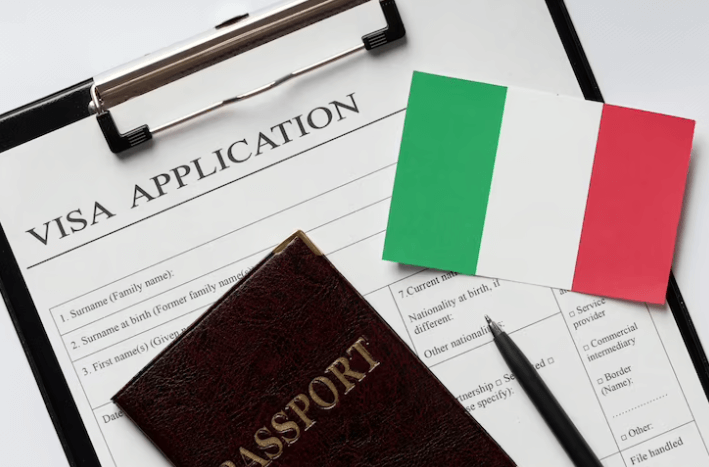How to Obtain Italian Citizenship: A Step-by-Step Guide
by Sumona How to Guides Published on: 25 April 2023 Last Updated on: 30 May 2023

Italian citizenship provides access to world-class healthcare, education, and a rich cultural heritage, and as such can be a valuable asset. Foreign citizens can obtain Italian citizenship in different ways, including by descent, marriage, and naturalization.
We requested an explanation from ItalyLawFirms regarding the process of acquiring Italian citizenship, and they provided us with this step-by-step guide that will assist you in navigating the various pathways to obtaining Italian citizenship.
Step 1: Determine Your Eligibility
First, determine which pathway to Italian citizenship is most applicable to you.
Depending on your personal circumstances, you may be eligible for citizenship via:
– Citizenship by descent (jure sanguinis): if you have Italian ancestry, you may qualify for citizenship by descent, that is to say by right of blood. This implies having an Italian-born parent, grandparent, great-grandparent, or ancestor, and meeting the conditions and prerequisites set by standing Italian law.
– Citizenship by marriage: if you are married to an Italian citizen, you may be eligible to apply for citizenship after a certain period of time.
– Citizenship by naturalization: if you have been living in Italy for over a certain number of years, usually 10, and meet residency and integration requirements, you may be eligible for citizenship through naturalization.
Step 2: Gather Supporting Documents
Once you have determined your eligibility, gather the necessary supporting documents for your application.
Citizenship by descent (jure sanguinis)
The essential condition is that the chain of citizenship transmission was not interrupted due to naturalization or voluntary renunciation by one’s Italian-born ancestor (i.e. anyone along the bloodline).
The interested party must therefore prove:
1. Descent from an Italian ancestor. There are no limits to the number of generations you can go back, but you must be able to produce birth, marriage, and death certificates for everybody along the bloodline;
2. That your Italian-born ancestor maintained his/her Italian citizenship until the birth of the descendant. The absence of naturalization or the date of naturalization of the ancestor must be proven by a certificate issued by the foreign authority in charge. As specifically regards Brazil, it is important to note that further to the ruling of the Italian Supreme Court (Corte di Cassazione) SS. UU. n. 25317 and 25318 issued August 24, 2022, the great naturalization of 1889 does not preclude the transmission of Italian citizenship;
3. That neither the applicant nor the ancestors ever renounced Italian citizenship, hence interrupting the chain of citizenship transmission. This is to be proven by presenting certificates issued by the competent Italian diplomatic and consular authorities.
Citizenship by naturalization
To obtain Italian citizenship through residency, applicants must provide various documents that demonstrate their eligibility. These include:
1) Residence Permit / EU Unlimited Residence Permit
To apply for citizenship by naturalization, one must be legally, uninterruptedly, and currently resident in Italy. That is to say, that one’s residency must be legally authorized and valid until the citizenship application process is concluded.
2) Valid Passport
3) Italian Identity Card
4) Fiscal Code
The fiscal code is an essential element in the process of obtaining Italian citizenship. It is an alphanumeric code that identifies an individual based on their name, surname, gender, and place of birth. The fiscal code plays a crucial role in accessing various services and submitting different types of applications, such as registering for the national health service, entering into contracts, requesting social benefits (such as disability allowances, family allowances, maternity allowances, and state bonuses), opening a business, and getting a job as a domestic worker.
If you don’t have a Codice Fiscale yet, you can obtain it through Italy Law Firms.
5) Historical Residence Certificate
The historical residence certificate is a document that pertains to a single person and certifies all changes of his/her address during a given timeframe.
6) Family Status Certificate
The family status certificate (certificato di stato di famiglia) is a document issued by the municipality of residence that certifies the family composition at a given time. When one applies for Italian citizenship, the certificate must refer to the time of one’s application. Applicants may complete it by going directly to the registry office of your municipality (Ufficio Anagrafe), where you will be provided with the necessary forms, or online by visiting the website of your municipality and downloading the needed documents.
7) Income certificates and proof of sufficient income
Applicants must present income certificates, i.e. either the CUD, Form 720, or Unico depending on one’s employment status, for the 3 years prior to the application date. Moreover, they must demonstrate sufficient personal or family income (considering all family members that belong to the applicant’s household) for the three years preceding the citizenship application.
The minimum annual income thresholds are €8,263.31 for single applicants, and €11,362.05 for applicants with a dependent spouse. The amount increases by €516 for each additional dependent person. It is essential to ensure that these income requirements are met and maintained throughout the entire citizenship application process.
8) Criminal Record Certificate
Applicants are required to provide a criminal record certificate from their country of origin, duly translated and legalized by the Italian diplomatic or consular authority in the applicant’s home country, or, if applicable, apostilled. This certificate is not necessary for applicants who were born in Italy or have been residents since before the age of 14.
9) Birth Certificate
The applicant’s birth certificate as issued by the authorities in charge in his/her country of birth, comprises all his/her personal data. Just like the criminal record certificate, the birth certificate must be translated and legalized by the Italian diplomatic or consular authority in the applicant’s home country, or, if applicable, apostilled.
10) Payments: citizenship fee (€250) and revenue stamp, “Marca da bollo” (€16)
Applicants are required to comply with the payment of a citizenship fee equal to €250, and a revenue stamp equal to €16. As of May 25, 2022, both payments can be made online, on the official government website.
12) Certificate of proficiency in the Italian language
All those who apply for Italian citizenship by residency and by marriage are required to prove they have adequate knowledge of the Italian language, that is to say, equal to a B1 level (intermediate) of the CEFR (Common European Framework of Reference for Languages).
Specifically, applicants must pass a B1 language test unless: they already hold certificates certifying their knowledge of the language equal to no less than an A2 level of the CEFR, or a language degree in Italian, or have attended an Italian school.
Children younger than 14 and people with serious learning disabilities are also exempt.
Italian citizenship by marriage or civil partnership (jure matrimonii)
Citizenship by marriage is granted when the applicant, a foreigner or stateless person, has been married to an Italian citizen for at least two years and can prove continuous legal residence in an Italian municipality for at least two years from the date of the marriage or his/her spouse’s naturalization. The two-year period is reduced by half in the presence of children born or adopted by the spouses.
Foreign nationals who have entered into a civil partnership (unione civile) with an Italian citizen are also entitled to apply for Italian citizenship. In this case, the civil partnership must be duly registered in the register of the municipality of residence (comune).
List of documents to be presented with the application
1) Birth certificate
The applicant is required to present his/her birth certificate as issued by the authorities in charge in his/her country of origin no more than six months prior to the application date. This document must comprise all the applicant’s, and his/her parents’, personal data. The birth certificate will have to be translated and legalized, or apostilled, in compliance with Italian law.
2) Criminal record
Applicants must also provide original criminal record certificates from their country of origin, any third countries (apart from Italy) where they have lived from the age of 14 onwards, and the country/countries they are nationals of. These certificates need to be current (i.e. issued no more than six months prior to the application date), and duly translated and legalized, or apostilled.
3) Payment of the citizenship fee (€250) and revenue stamp (€16)
Applicants are required to pay a citizenship fee and purchase a revenue stamp (Marca da bollo in Italian). The amount due for the citizenship fee is €250, whereas the revenue stamp costs €16. Both payments can be processed online, on the official government website.
4) Valid ID (identity card and passport)
The applicant must present his/her passport and identity card. Both documents must be current and valid.
5) Certificazione di matrimonio (full marriage certificate)
Applicants must present a copy of their full marriage certificate, or an extract of the same (this alternative document is called “estratto per riassunto del registro dei matrimoni”, in Italian). Again, this document must be current, which is to say issued within no more than 6 months before the application). EU citizens are allowed to present a self-certification instead of the marriage certificate, along with a family status certificate (certificato di stato di famiglia) and a document that certifies the citizenship of their spouse or partner.
6) Certificates: family status and residence
The certificato di stato di famiglia (family status certificate) certifies the composition of Italian families resident in an Italian municipality. Those who apply for Italian citizenship by marriage can contact the registry office (Ufficio Anagrafe) of the municipality where they live. Alternatively, you can visit the municipality and download the form. The certificato di residenza (residence certificate) certifies your current residence, i.e. your address. Copies of both are needed to file an application for Italian citizenship by marriage.
7) Proof of knowledge of the Italian language (B1 level)
To apply for Italian citizenship by marriage, you will have to prove that you “know enough” Italian, specifically enough to pass a B1 level exam. The B1 level according to the CEFR (Common European Framework of Reference for Languages) corresponds to an intermediate level. Persons who can prove they have very good knowledge of Italian, certified by pre-existing certificates or studies, are not required to take the test.
Step 3: How To Submit Your Application
There are different authorities in charge of handling and overseeing citizenship application processes, depending on whether these are by descent, by marriage, or by naturalization.
In detail:
– To apply for citizenship by descent, contact the Italian consulate or embassy in your country of residence.
– To apply for citizenship by marriage or by naturalization, contact the Prefettura (provincial government office) in your place of residence in Italy.
Step 4: Attend an Interview (if required)
In some cases, you may be required to attend an interview as part of the application process. During the interview, you will be asked questions about your personal history, your connection to Italy, and why you wish to obtain citizenship.
Step 5: Wait for the Decision
The processing time for Italian citizenship applications can vary depending on the path selected and your individual circumstances.
Additional:







































































































